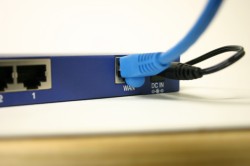Culture | August 17th, 2016

By Chuck Solley
rcsolly@gmail.com
(row´ter) (n.) A router is a devicethat forwards data packets along networks. A router is connected to at least two networks, commonly two LANs or WANs or a LAN and its ISP's network. Routers are located at gateways, the places where two or more networks connect.
Got that! That is my Geek Speak definition of the week. In terms we can all understand, the internet is the first WAN or Wide Area Network and your computer is the LAN or Local Area Network. The router is in the middle. So why should we have a router? The next paragraph is very important:
For home and business computer users who have high-speed Internet connections such as cable, satellite, or DSL, a router can act as a hardware firewall. This is true even if the home or business has only one computer. Many engineers believe that the use of a router provides better protection against hacking than a software firewall, because no computer Internet Protocol addresses are directly exposed to the Internet. This makes port scans (a technique for exploring weaknesses) essentially impossible. In addition, a router does not consume computer resources as a software firewall does. Commercially manufactured routers are easy to install, reasonably priced, and available for hard-wired or wireless networks.
A good home router price range is $70 to $500 dollars. If you have only one computer, buy a router for under $100. It should be placed near your computer. One cable runs to your DSL or cable modem, a second to your ethernet port on your computer and then plug it into the wall outlet for power. This is the wired method of connecting to your home system.
Wireless methods are different but not difficult. Follow the instructions that came with the router. Remember, if you are connecting wirelessly, there is a range limit depending on how many walls or obstructions there are between your computer and the router. Range extenders do this reasonably well but there are still limitations. I have one in my home but the system is still flaky at times, depending on where my laptop is in the house.
In a previous column, I mentioned that I would not be recommending a particular brand or type of hardware for your home or office. I feel that you should do your own due diligence (research) and read about these various products on the Internet. I will try to lead you to the sources for hardware and software and you can do the same for me via email.
I do make exceptions for new products. Here is an exception:
The newest entry into the world of routers is the EERO router. It consists of 3 units that are placed in various places in your home or office. They form a “net” of connectivity. The system uses 5 GHz radio waves which increase throughput but they can take input from more than one of the units at a time, making the lack of connectivity a thing of the past. There is an app for setup and control of the system. This is a welcome relief for many of us who have set up wired and wireless systems. They can be difficult and time consuming.
This seems to be the state of the art for routers and as such, the price for a three unit system is $499.00. Check this one out at www.eero.com. If you have one of these systems I would like to hear from you!
Windows 10 alert
There have been many comments, this week, about the Anniversary Upgrade to Windows. There have been many problems associated with it. It is known as upgrade #1607. If you are using Windows 10 make sure you read the tech newsletters or whatever your computer sources are before you load #1607. If you are considering upgrading to Windows 10, you might consider waiting until Microsoft gets it straightened out.
February 16th 2026
February 13th 2026
January 15th 2026
January 15th 2026
December 18th 2025
__293px-wide.jpg)
__293px-wide.png)


_(1)__293px-wide.jpg)
